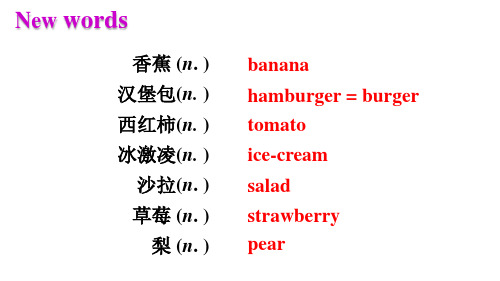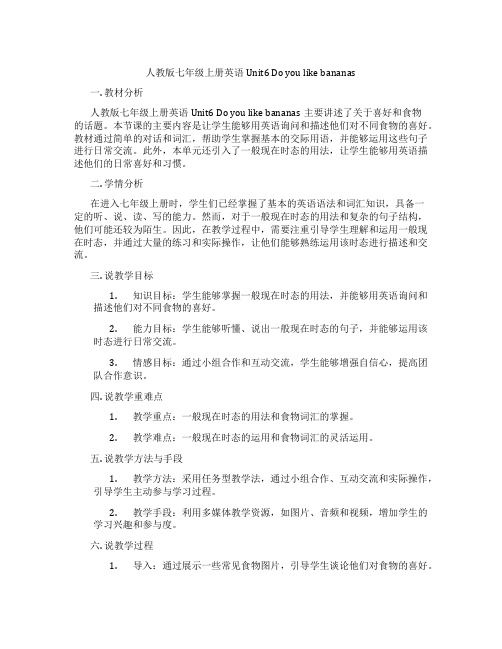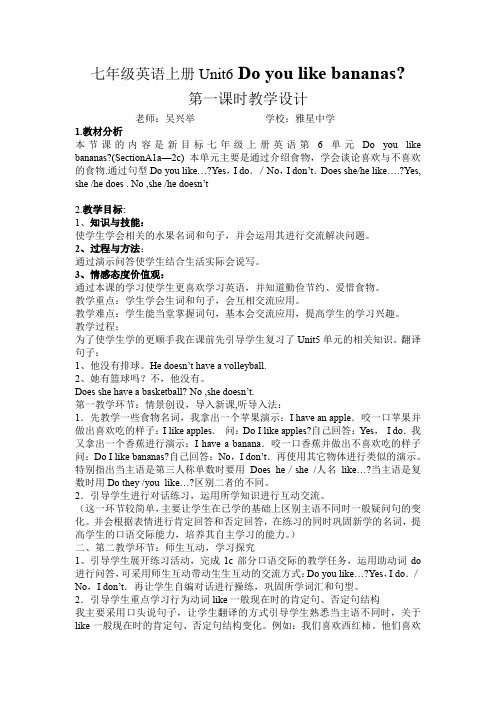七年级英语上册Unit6DoyoulikebananasSunday复现式周周练人教新目标版
- 格式:ppt
- 大小:1.79 MB
- 文档页数:21



人教版新目标七年级英语上册第六单元Unit6Doyoulikebananas单元大归纳Unit6单元大归纳一、主题知识梳理1.单词banana n. 香蕉hamburger n. 汉堡包tomato n. 西红柿strawberry n. 草莓bread n. 面包birthday n. 生日vegetable n. 蔬菜fruit n. 水果carrot n. 胡萝卜chicken n. 鸡肉breakfast n. 早餐;早饭well adv. 好;令人满意地habit n. 习惯healthy adj. 健康的really adv. 真正地question n. 问题want v. 需要;想要2.短语1).birthday dinner生日晚宴2).next week下周3).think about 考虑;思考4).how about 怎么样5).some fruit一些水果6).sound good 听起来不错7).sports star 体育明星8).eat well吃得好9).eating habits 饮食习惯10).for breakfast/lunch/dinner作为早餐/午餐/晚餐11).after breakfast/lunch/dinner 早饭/午饭/晚饭后12).one last question 最后一个问题13).healthy food 健康的食物14).be fat 变胖15).ask sb. about sth. 问某人关于某事3.用法1.-Do you like..?-Yes,I do. 是的,我喜欢。
-No, I don’t. 不,我不喜欢。
2.-Does he/she like..?他/她喜欢...吗?-Yes,he/she does. 是的,他/她喜欢。
-No,he/she doesn’t.不,他/她不喜欢。
3.I like/don’t like... 我喜欢/不喜欢4.like...for breakfast/lunch/dinner. 早餐/午餐/晚餐喜欢吃...5.want to be+形容词/名词想要变得.../想要成为...4.经典句型1) —Do you like salad?你喜欢沙拉吗?—Yes, I do./No, I don’t.是的,我喜欢。

人教版七年级上册英语Unit6 Do you like bananas一. 教材分析人教版七年级上册英语Unit6 Do you like bananas主要讲述了关于喜好和食物的话题。
本节课的主要内容是让学生能够用英语询问和描述他们对不同食物的喜好。
教材通过简单的对话和词汇,帮助学生掌握基本的交际用语,并能够运用这些句子进行日常交流。
此外,本单元还引入了一般现在时态的用法,让学生能够用英语描述他们的日常喜好和习惯。
二. 学情分析在进入七年级上册时,学生们已经掌握了基本的英语语法和词汇知识,具备一定的听、说、读、写的能力。
然而,对于一般现在时态的用法和复杂的句子结构,他们可能还较为陌生。
因此,在教学过程中,需要注重引导学生理解和运用一般现在时态,并通过大量的练习和实际操作,让他们能够熟练运用该时态进行描述和交流。
三. 说教学目标1.知识目标:学生能够掌握一般现在时态的用法,并能够用英语询问和描述他们对不同食物的喜好。
2.能力目标:学生能够听懂、说出一般现在时态的句子,并能够运用该时态进行日常交流。
3.情感目标:通过小组合作和互动交流,学生能够增强自信心,提高团队合作意识。
四. 说教学重难点1.教学重点:一般现在时态的用法和食物词汇的掌握。
2.教学难点:一般现在时态的运用和食物词汇的灵活运用。
五. 说教学方法与手段1.教学方法:采用任务型教学法,通过小组合作、互动交流和实际操作,引导学生主动参与学习过程。
2.教学手段:利用多媒体教学资源,如图片、音频和视频,增加学生的学习兴趣和参与度。
六. 说教学过程1.导入:通过展示一些常见食物图片,引导学生谈论他们对食物的喜好。
2.新课呈现:引入一般现在时态的概念,并通过示例句子让学生理解一般现在时态的用法。
3.对话练习:让学生听录音或观看视频,模仿对话中的句子,并进行角色扮演。
4.小组活动:学生分组进行讨论,用英语询问和描述他们对食物的喜好。
5.巩固练习:通过完成练习题和互动游戏,让学生进一步巩固一般现在时态的用法。

Unit 6 Do you like bananas?一、单词:like banana hamburger tomatobroccoli French fries orange icecream salad strawberry pearegg apple carrot chickenfruit vegetable breakfast lunchdinner runner eat runstar healthy food dessertlist have breakfast lots of ice creamlike doing sth.like to do sth.二、语法重点:1. 表达“喜欢”与“不喜欢”;2. 可数名词与不可数名词。
三、句型:1. ─Do you like salad? ─No, I don’t./Yes, I do.2. ─Do they like French fries? ─Yes, they do. / No, they don’t.3. ─Does he like strawberries? ─Yes, he does. / No, he doesn’t.4. I like oranges.5. They like salad.6. She likes ice cream.基础知识练习(一)翻译下列词组:1.吃早餐_______________________2.吃得好______________________________3.很多朋友_______________________4.赛跑明星____________________________5.列出清单________________________6. 以…做早餐___________________________7.健康食品_______________________ 8.许多,大量(二)用所给单词的适当形式填空:1. They all like (bread), they (not like) rice.2. Do you like (orange)?3. She has (vegetable) and fruit for supper.4. he (have) hamburgers for lunch?5. There are four Americans and ten (Chinese) in his class.6. Julia has a lot of (friend) at school.7. Look! Some chicken on the plate(盘子),and some apples next to the plate. ( be )8. Sandra is a (run) star.(三)单项选择:( ) 1. ----_______?---- No, I don’t.A. Do you like breadB. Do it like thisC. Are you like breadD. Does he like it ( ) 2. she like broccoli?A. DoB. DoesC. IsD. Are( ) 3. I like eggs, tomatoes and bananas for _______breakfast.A. theB. aC. /D. an( ) 4. ---- _______they ______ a new computer? ---- Yes, they like it very much.A. Does ; hasB. Do ; haveC. Does ; haveD. Does ; like ( ) 5. Broccoli and carrots are______.A. fruitsB. fruitC. vegetablesD. vegetable ( ) 6. ---- Is my picture here? ---- ________ .A. Yes, you areB. Yes, it isC. No, they aren’tD. No, he isn’t ( ) 7. Are those in the picture?A. apples treesB. apples treeC. apple treesD. apple tree ( ) 8. “Do you have a basketball?”“______.”A. Yes,I haveB. No,I haven’tC. Yes, I am.D. Yes,I do ( ) 9. He like bananas.A. doB. isC. doesn’tD. not( )10. There is food in the fridge.A. lot ofB. lots ofC. a lots ofD. a lot(四)改错:1.—Do they like eggs? —Yes, they are. ( )A B C D2. Does you brother like sports? ( )A B C D3. I have five oranges, and Dave has six tomatos. ( )A B C D4. Broccoli is a healthy food. ( )A B C D5.—What’s she like? —Sports. ( )A B C D能力提升(一)单项选择:( ) 1. My brother Jack _______like flying kites ________playing chess.A. don’t;orB. don’t;andC. doesn’t;orD. doesn’t;and ( ) 2. My brother very much.A. like bananaB. likes bananas C.like bananas D. likes banana ( ) 3. We can buy some apples in those shop.A. fruitsB. fruitC. fruit’sD. fruits’( ) 4. There is some on the table.A. bananaB. chickenC. tomatoesD. apple( ) 5. A lot of chicken on the plate.A. areB. isC. standD. play( ) 6. The lunch in our school ______ good .A. areB. doesC. isD. /( ) 7. Tom eats .A. goodB. badC. muchD. many( ) 8. Emma and Paul French fries.A. is likeB. likesC. are likeD. like( ) 9. What she have dinner?A. does; /B. does; forC. do; forD. do; at( ) 10. The baby is . It often laughs(笑).A. hungryB. thirstyC. healthyD. health( ) 11. People in American eat much .A. coffeeB. onionsC. beefD. iced water(冰水)( ) 12. ---- Would you like some .? ---- Yes, please. I’m a little thirsty.A. breadB. meatC. appleD. orange(二)句型转换:1. My father has lunch at home. (改为否定句)My father________ ________ lunch at home.2. There are many books in the drawer. (改为同义句)There are ________ ________ books in the drawer.3. Jenny likes eggs. (改为一般疑问句并作否定回答)________ Jenny ________ eggs? ---- No, ________ ________.4. She eats fruits and hamburgers for lunch. (就划线部分提问)________ ________ she for lunch?5. my ,egg, every, an, breakfast, has, for, day, uncle (连词成句)______ __ .6. My parents like tomatoes. (改为一般疑问句并作肯定回答)________ ________ parents tomatoes? ---- Yes, ________ ________.(三)汉译英:根据所给汉语意思,完成下列句子:1.盘子里有很多花椰菜。

七年级英语上册Unit6 Do you like bananas?第一课时教学设计老师:吴兴举学校:雅星中学1.教材分析本节课的内容是新目标七年级上册英语第6单元Do you like bananas?(SectionA1a—2c) 本单元主要是通过介绍食物,学会谈论喜欢与不喜欢的食物.通过句型Do you like…?Yes,I do./No,I don’t.Does she/he like….?Yes, she /he does . No ,she /he doesn’t2.教学目标:1、知识与技能:使学生学会相关的水果名词和句子,并会运用其进行交流解决问题。
2、过程与方法:通过演示问答使学生结合生活实际会说写。
3、情感态度价值观:通过本课的学习使学生更喜欢学习英语,并知道勤俭节约、爱惜食物。
教学重点:学生学会生词和句子,会互相交流应用。
教学难点:学生能当堂掌握词句,基本会交流应用,提高学生的学习兴趣。
教学过程:为了使学生学的更顺手我在课前先引导学生复习了Unit5单元的相关知识。
翻译句子:1、他没有排球。
He doesn’t have a v olleyball.2、她有篮球吗?不,他没有。
Does she have a basketball? No ,she doesn’t.第一教学环节:情景创设,导入新课,听导入法:1.先教学一些食物名词,我拿出一个苹果演示:I have an apple.咬一口苹果并做出喜欢吃的样子:I like apples.问:Do I like apples?自己回答:Yes,I do.我又拿出一个香蕉进行演示:I have a banana.咬一口香蕉并做出不喜欢吃的样子问:Do I like bananas?自己回答:No,I don’t.再使用其它物体进行类似的演示。
特别指出当主语是第三人称单数时要用Does he/she /人名like…?当主语是复数时用Do they /you like…?区别二者的不同。
Unit 6 Do you like bananas?一.短语归纳:1.have sth. = eat sth. 吃······2.John’s birthday dinner约翰的生日大餐3.next week下周4.think about思考5.how about······怎么样?6.some fruit一些水果7.some tomatoes一些番茄8.many apples许多苹果9.much chicken许多鸡肉10.his birthday他的生日11.sport star体育明星12.eating habits饮食习惯13.for breakfast对于早餐14.healthy food健康的食物15.ask sb. about sth.问某人关于某事二.重点句型:1.Cindy likes healthy food.2.—Do you like tomatoes? —Yes, I do / No, I don’t.3.—Does she / he like strawberries? —Yes, she / he does. / No, she/ he does’t4.I like/ don’t like apples.5.He likes/ doesn’t like pears.6.like … for breakfast / lunch / dinner 早餐/午餐/晚餐喜欢…7.Hey, John’s birthday dinner is next week.8.Let’s think about the food.9.How ahout burgers, vegetable salad, and some fruit?10.I think John likes strawberries and apples.11.What do you like for breakfast?12.I don’t want to be fat.三.重点语法(一)一般现在时1.用法:1).表示经常性,习惯性,永久性的动作或存在的状态.This is your book. 这是你的书。
Unit6Do you like bananas?Part1Words and Expressionsbanana/bə'nɑːnə/n.香蕉hamburger/'hæmbɜː(r)gə(r)/n.汉堡包tomato/tə'mɑːtəʊ//tə'meɪtəʊ/n.西红柿ice-cream/,aɪs'kri:m/n.冰激凌salad/'sæləd/n.沙拉strawberry/'strɔːbəri/n.草莓pear/peə(r)/n.梨milk/mɪlk/n.牛奶bread/bred/n.面包birthday/'bɜː(r)θdeɪ/n.生日dinner/'dɪnə(r)/n.(中午或晚上吃的)正餐week/wiːk/n.周;星期think about思考;思索food/fuːd/n.食物sure/ʃʊə(r)/adv.当然;肯定;一定How about…?(提出建议)……怎么样?burger/'bɜː(r)gə(r)/n.(=hamburger)汉堡包vegetable/'vedʒtəbl/n.蔬菜fruit/fruːt/n.水果right/raɪt/adj.正确的;适当的apple/'æpl/n.苹果then/ðen/adv.那么egg/eg/n.蛋;鸡蛋carrot/'kærət/n.胡萝卜rice/raɪs/n.大米;米饭chicken/'tʃɪkɪn/n.鸡肉so/səʊ/conj.(引出评论或问题)那么breakfast/'brekfəst/n.早餐;早饭lunch/lʌntʃ/n.午餐star/stɑː(r)/n.明星;星星eat/iːt/v.吃well/wel/adv.好;令人满意地habit/'hæbɪt/n.习惯healthy/'helθi/adj.健康的really/'riːəli/adv.真正地question/'kwestʃən/n.问题want/wɒnt/v.需要;想要be/biː/v.变成fat/fæt/adj.肥的;肥胖的Part2:Texts课文(一)Jack:Hey,John’s birthday dinner is next week.Let’s think about the food.Tom:Sure.How about burgers,vegetable salad,and some fruit? Bill:Sounds good.John likes hamburgers.Jack:Oh,I don’t like salad.Bill:But John likes salad,and it’s his birthday.Jack:Yes,you’re right.What about the fruit?Tom:I think John likes strawberries and apples.Jack:OK.Let’s have strawberries and apples then. Structure——谈论好恶1.Do you like salad?Yes,I do./No,I don’t.2.Do they like pears?Yes,they do./No,they don’t.3.Does she like tomatoes?Yes,she does./No,she doesn’t.4.I like oranges.I don’t like bananas.5.We like rice.We don’t like hamburgers.6.He likes ice-cream.He doesn’t like vegetables.重点句型:—Do/Does sb.like…?—Yes,sb.do/does.—No,sb.don’t/doesn’t.sb.like/likes….sb.don’t/doesn’t like….Underline the correct words in the brackets.在括号内正确的单词下画线。